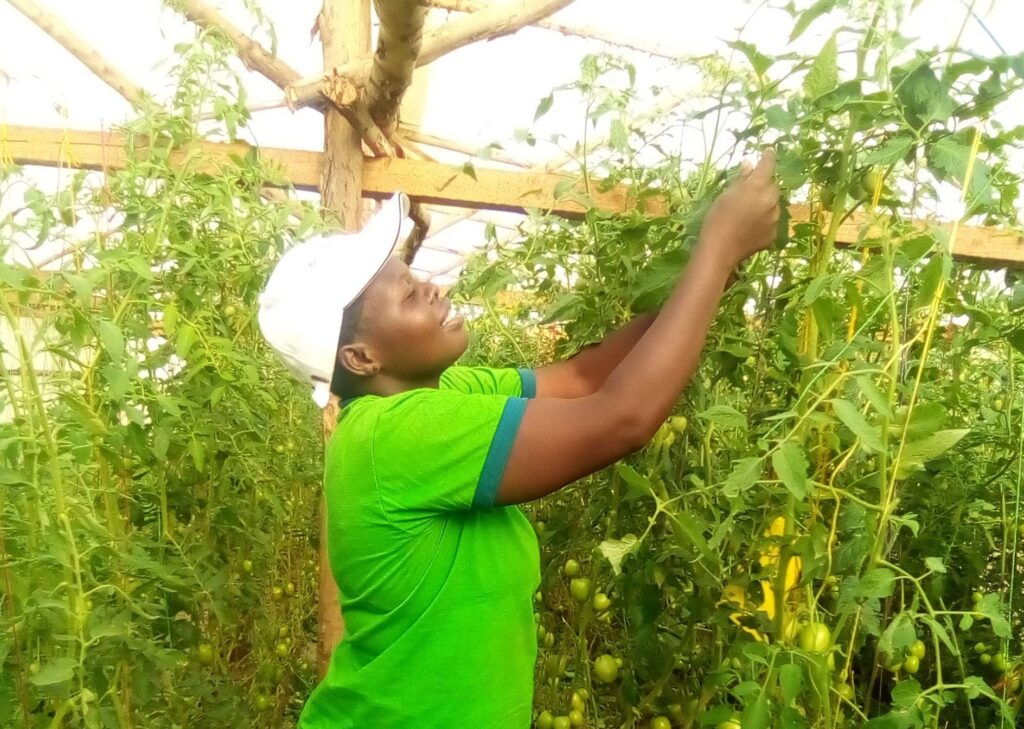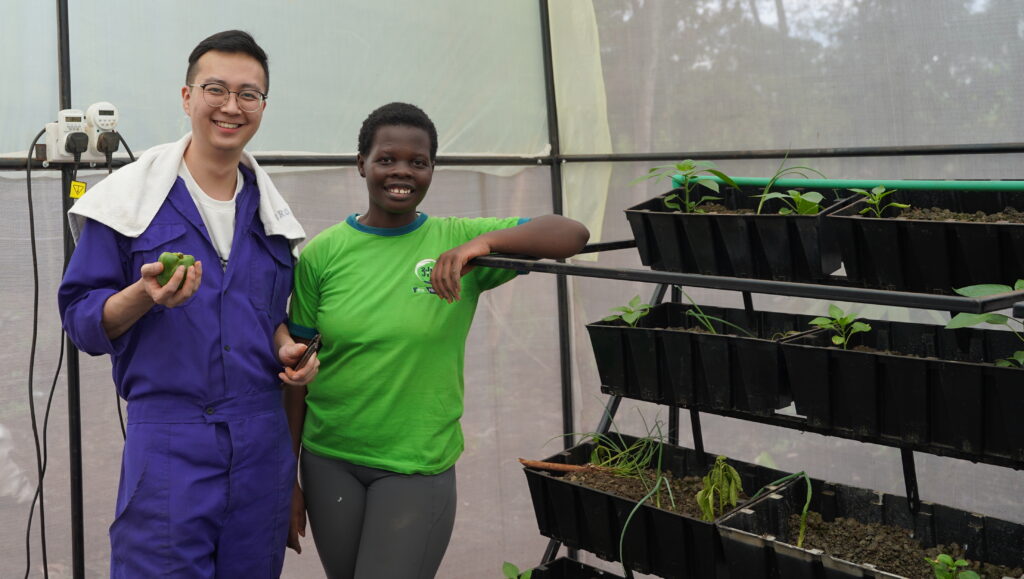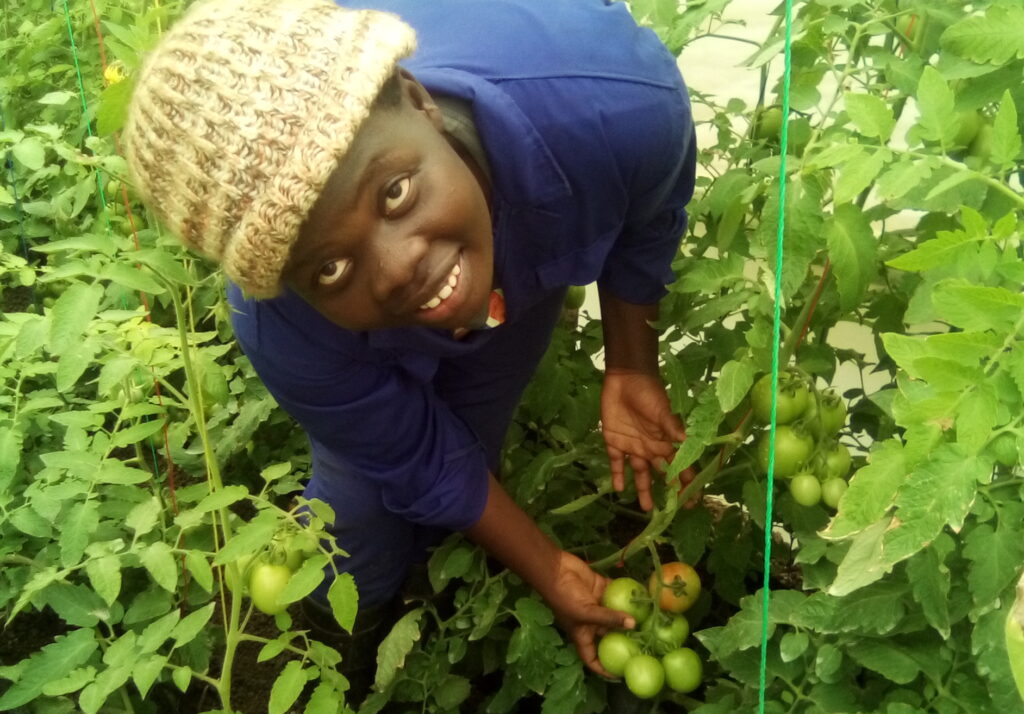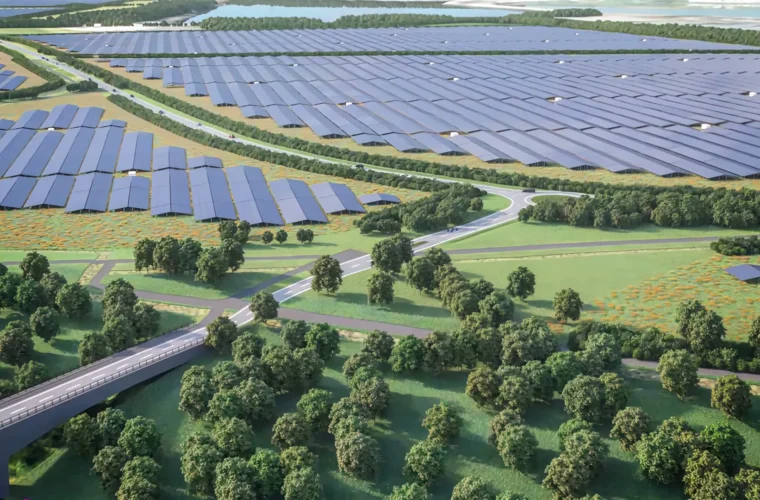Young Female Entrepreneur Has an Idea to Solve Food Shortage in Africa
The life of Elizabeth Okullow, a 24-year-old entrepreneur and microbiologist based in Kenya, cannot be explained without her love for plants. Growing up, she had spent most of her time studying local herbs, climbing up trees for fruits, and searching for indigenous plants.
Okullow’s study on plants did not just end as a childhood hobby, however. Her passion changed into a business that could even provide solutions to food security problems in Africa. Okullow’s mission, now, is to ensure that “there is food in every place of Africa”, using hydroponics.
Okullow, CEO and founder of a social venture Lafamia Greens, tells 4i-mag her plans to increase food production in African cities, and how her journey has been since its foundation.

Photo: Elizabeth Okullow, CEO and Founder of Lafamia Greens
Q. Tell us more about your venture Lafamia Greens.
Lafamia Greens is a social enterprise founded in Kenya in 2019. We use hydroponics to grow organic foods. The company is based a few kilometres away from Nairobi, the capital city of Kenya. The markets, or consumers, we target are in urban areas where the majority of the people rely on vegetables produced in rural areas. Shipping vegetables from rural areas to cities could take much time and let the products go bad during the transfer. So, my goal is to fill the gap in the supply and demand for vegetables in urban areas.
Q. Why did you decide to make an agribusiness-venture of your own?
Agriculture is an important industry in Africa. Each country in Africa has a different situation in the industry, but in general, the continent’s gross domestic product (GDP) mainly comes from this. The exports of agricultural products we make support our economy. Those products support many small-sized farms in Africa.
We should realise that everyone is a part of the agricultural industry, whether directly or indirectly. Many people don’t know this, but we should show more attention in the sector to protect and improve our food security. If people could think of different, creative ways of promoting this sector, it could solve even some serious social problems, such as unemployment.

Photo: Elizabeth Okullow (Right), CEO and Founder of Lafamia Greens
Personally, I simply love plants and nature. I spent several years studying microbiology at my college, looking at microorganisms through microscopes at labs and research institutions. By the end of college, I realised that I love to learn more about plants and be surrounded by green environments. Then, it hit me that starting a business [based on my interest and major] in the agricultural sector could turn out to be promising.
Also, I was influenced by my mom, who is a forester. She loves to grow trees, crops, and other plants. You could say that the passion for plants runs in our blood.
Q. What is hydroponics, a farming system used at Lafamia Greens?
Hydroponics system, or hydroponic farming, is a method of farming without soil. Instead of soil, this method uses different mediums to grow plants. The use of nutrients mixed with water is one of the most common mediums you can see.
There are many advantages of using hydroponics. First, this system can save the amount of water used in farming. This nutrient-rich water is run throughout the circuit and sent back [to the pump]. This way, the excess can be recirculated, which enables farmers to save up to 80 per cent of the water.
Using hydroponics can also save some space. For example, let’s say a farmer has a 15 metre by 8 metre greenhouse to grow crops. There, he can grow over 1,000 roots of different vegetables. However, this can depend on how you build the structure. Hydroponic-powered farms can be made either vertically or horizontally.

Photo: Elizabeth Okullow, CEO and Founder of Lafamia Greens
There are some disadvantages, too. The use of this system is capital-intensive. Farmers would need some money for the initial investment. In the long run, however, as long as they know how to use the system, the farmers would be able to compensate for the money they invested and earn more profits. I think it could bring them more money than conventional farming methods.
Also, using hydroponics, farmers should mind possible bacterial contamination. The system can be easily contaminated. Every time I go to the farm, there’s a check-in sanitisation procedure I go through. I also try not to touch surfaces [of plants] to prevent any possible contamination.
Q. How has hydroponics been used at Lafamia Greens, and how do people react to your business?
We tried hydroponics to produce vegetables within our farms. As of now, we have trained tens of farmers, but we want to move forward. We want to create more job opportunities, especially for the younger, and let them know that hydroponics could be a new way of life, and useful in farming.
At first, when we founded this venture, many people asked: “What is going on at Lafamia Greens?”, “What does hydroponic farming mean?” or “Does this kind of system work in the real world?”
Thankfully, some farmers and families showed interest in our venture and hydroponics upon hearing our story. We would love to train those people to learn more about hydroponics. We believe that farmers who had successful experiences with hydroponics [thanks to us], can spread the news to other people in the town, and make this system a standard way of farming [in Africa].
Q. How can Lafamia Greens improve food security in Africa?
So far, we have provided hydroponics kits mostly to Kenyan farmers, but we’ll introduce our kits even to those who live outside of Kenya.
The kits we make and sell at Lafamia Greens are small, portable ones. This means all farmers in the agricultural sector, including gardeners and hobbyists, will find our kits useful. It could also be an opportunity for them to learn more about hydroponics, by starting with our kits.
Also, in the next two years, Lafamia Greens’ plan is to partner with real estate or construction companies. Our goal is to ensure that as many houses as possible are provided with a hydroponics system. We want families to buy housings with the system and have their own small-sized farms to grow plants on balconies.
Q. Has Lafamia Greens partnered with other affiliations or companies?
Last year, I was selected as one of the cohorts at Africa Yes Program, a six-month training programme for aspiring entrepreneurs in Africa. It has been quite helpful to improve my venture Lafamia Greens. Before this programme, our venture was only known to a few. This programme spread the news of our venture [to the world]. I learned how to tell a compelling story, design, think and grow my business throughout the programme.
I also got to find a reliable partner during the programme. We found this company called ClimGric Africa that uses the system to grow strawberries. We saw this as an opportunity to come together and build a model hydroponics strawberry farm. We hope to train farmers on how to grow strawberries with their help. Recently, two of our companies together have received 4,000 dollars of endowment [from our investors] to stretch our strawberry farming business.

Photo: Han Seung-yoon (Left), a staff member of Africa Yes Centre, and Elizabeth Okullow, CEO and Founder of Lafamia Greens
Q. Do you sometimes feel challenged to be a young, female entrepreneur in the industry?
Being a young, female entrepreneur in the agricultural industry is quite hard. The competition in the industry is intense. I sometimes face conflicts with other male entrepreneurs running the industry, wanting to teach you how things are supposed to be done. They could even say something that could bring me down as they hear about my story and ideas. I am also a bit outgoing, which can be an issue in this industry because people could think that I’m overconfident.
Also, I’m seen as a young person here in Kenya. The majority of people around my age are still struggling to find job opportunities, while I’m here running my venture. But people would still think that I’m too young to run a business and expect me to quit and join other existing companies instead. For example, my dad once told me: “You should go out and get a job!” He thinks that I should have a white-collar job, sitting at an office, as I am a college grad. So, I often try to assure him by saying, “I can do this.”

Photo: Elizabeth Okullow, CEO and Founder of Lafamia Greens
Q. How can the agricultural business develop further in Africa?
The agricultural sector seems to be widely understood that it’s important in Kenya and the whole of Africa. The industry is heading in the right direction, but there still are many challenges left. We need partnerships, where people can come together and cooperate in this big industry, ranging from engineering to marketing. We need more people with various talents to deepen and diversify our knowledge of agriculture.
We also would need to adopt more advanced technologies for further development, for example, as we discussed the hydroponics system. When you come to some parts of Africa, you would realise that people still farm like they used to do thousands of years ago. It’s necessary to bring innovation in this sector to improve our efficiency and promote agricultural businesses.
Lastly, we need to remind ourselves that we’re also dependent on the agricultural industry, directly and indirectly. If you eat food to live, that means agriculture is an important sector to maintain your life. If you could invest in this sector, perhaps for start-ups like ours, it would be immensely helpful in improving our lives.



